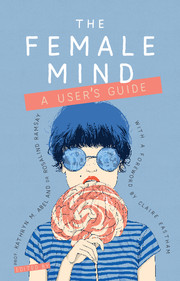Book contents
- Frontmatter
- Acknowledgements
- Contents
- Foreword
- Introduction: being female
- Part I Women in perspective
- Part II Women and society
- Part III Women and their environment
- Part IV Women and specific disorders
- 18 Depression and other mood disorders
- 19 Anxiety disorders
- 20 Trauma and post-traumatic stress disorder
- 21 The dangers of rumination
- 22 Obsessive–compulsive disorder
- 23 Eating disorders and body dysmorphic disorder
- 24 Psychosexual disorders
- 25 Personality disorders: risks and recovery
- 26 Self-harm
- 27 Women and addiction
- 28 Autism spectrum disorder
- 29 Attention-deficit hyperactivity disorder
- 30 Psychotic illness
- 31 Postnatal depression and postpartum psychosis
- 32 Living longer: normal age-related changes, dementia and depression
- Part V Women and treatment
- Contributors
- Index
30 - Psychotic illness
from Part IV - Women and specific disorders
Published online by Cambridge University Press: 02 January 2018
- Frontmatter
- Acknowledgements
- Contents
- Foreword
- Introduction: being female
- Part I Women in perspective
- Part II Women and society
- Part III Women and their environment
- Part IV Women and specific disorders
- 18 Depression and other mood disorders
- 19 Anxiety disorders
- 20 Trauma and post-traumatic stress disorder
- 21 The dangers of rumination
- 22 Obsessive–compulsive disorder
- 23 Eating disorders and body dysmorphic disorder
- 24 Psychosexual disorders
- 25 Personality disorders: risks and recovery
- 26 Self-harm
- 27 Women and addiction
- 28 Autism spectrum disorder
- 29 Attention-deficit hyperactivity disorder
- 30 Psychotic illness
- 31 Postnatal depression and postpartum psychosis
- 32 Living longer: normal age-related changes, dementia and depression
- Part V Women and treatment
- Contributors
- Index
Summary
Holly's story
Holly is an 18-year-old student who lives with her mother in an inner-city area. She had been well until about 5 months previously. In spite of being an above-average student, she started having difficulty with schoolwork. She became easily flustered about homework, frequently missed deadlines and cried about how stressed and tired she felt. She started missing school frequently.
Two months later, Holly started having aches and strange feelings all over and inside her body. She started hearing indistinct whispers, which distressed and further distracted her. The whispering gradually became clearer, until she could make out voices telling her she was ugly and really a man. She started to become unsure of her gender, attributing the strange bodily sensations to her changing sex. She later refused to attend school at all and also refused to see the general practitioner (GP).
Holly became increasingly tearful and stopped washing. She locked herself in her room and her GP advised her mother to take Holly to the local hospital for assessment. Holly was subsequently referred to the local community mental health team, which became concerned about her level of distress and the thoughts she was experiencing that life was not worth living. The mental health team identified her as having a psychotic illness and she was admitted to hospital.
Holly had no past history of psychiatric illness and her childhood was uneventful, except that her mother had experienced postnatal depression after Holly's birth. Holly's parents were divorced, but had shared custody. Although Holly had not visited her father for 3 months before admission, she felt she had a loving relationship with both of them. Her personality had been described as ‘bubbly and warm’ until 6 months before admission, when she had become less happy and more anxious than usual.
Holly was an in-patient for 3 weeks. She was treated with antipsychotic medication. She also received a sleeping tablet at night for a short period after her admission and underwent tests to make sure there were no underlying physical reasons for her symptoms.
Holly settled quickly on the ward and had a good rapport with her treatment team (psychiatrists, nurses, psychologist and occupational therapist).
- Type
- Chapter
- Information
- The Female MindUser's Guide, pp. 195 - 201Publisher: Royal College of PsychiatristsPrint publication year: 2017

